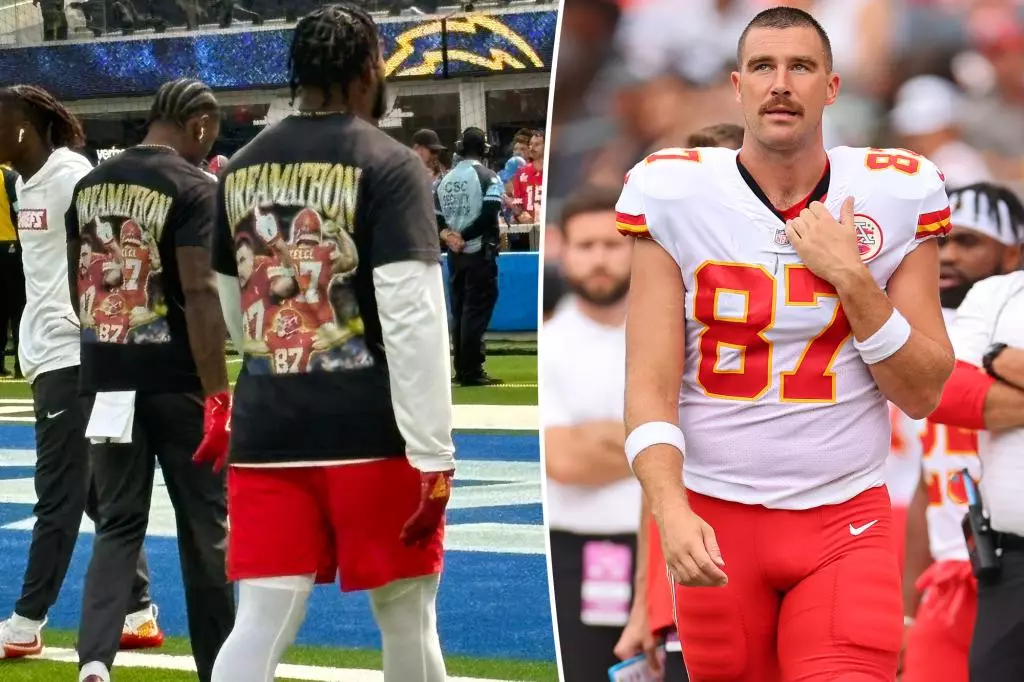In the high-pressure environment of professional sports, team dynamics and support systems can profoundly influence player morale and performance. This was clearly exhibited recently when Kansas City Chiefs’ wide receivers—Rashee Rice, JuJu Smith-Schuster, and Mecole Hardman—demonstrated their solidarity with tight end Travis Kelce by donning custom T-shirts before their game against the Los Angeles Chargers. The act was a reminder that, despite the scrutiny Kelce has faced over his recent performances, he remains a vital figure within the team. Rice’s initiative to purchase these shirts speaks volumes about the mentorship and support that Kelce has provided to his teammates, establishing him not only as a mentee but as a motivational leader.
The shirts, designed in Chiefs’ colors, featured Kelce’s name and images of him in action, while also branding “Dreamathon” on the back—a tribute to the creators of the tee. This public show of camaraderie is crucial in a sport where mental fortitude often determines the outcome of games. Moreover, the decision to wear these shirts isn’t simply a fashion statement; it’s a declaration of loyalty and a rallying cry that the Chiefs are indeed a family that supports each other even in the face of adversity.
A significant component of this narrative lies in the criticism that Kelce has recently endured. Analysts, including former ESPN analyst Todd McShay, have suggested that Kelce’s performance decline is linked to his newfound celebrity status due to his high-profile relationship with pop sensation Taylor Swift. Such commentary raises questions about the intersection of personal life and professional performance, especially in the volatile spotlight of the NFL. McShay’s remarks, while perhaps provocative, open a dialogue about the challenges athletes face when they achieve fame beyond their sport.
The scrutiny of Kelce’s weight and lifestyle choices highlights a troubling tendency in sports media to sensationalize personal matters and draw correlations where there may be none. Critics often forget the relentless pressure athletes face week after week, and how external factors can compound an already strenuous situation. Kelce himself acknowledged the criticism during a recent episode of his “New Heights” podcast, candidly admitting that he could “do better” on the field. This level of self-awareness is commendable; it reveals a player willing to take accountability and challenge himself to improve, rather than deflect blame or allow outside noise to distract him from his goals.
Kelce’s vulnerability aligns with a broader theme within the Chiefs’ offense. Their earlier gesture of support for running back Isiah Pacheco, following his injury, further highlights a culture of compassion and collective resilience. Sports at this level aren’t just about individual triumph; they are often underpinned by a foundation of teamwork and unity. The Chiefs’ players understand that success is rarely achieved in isolation; it requires collective effort, both on and off the field.
As NFL teams frequently experience fluctuations in performance, distractions can threaten cohesion. However, the Chiefs seem committed to overcoming any hurdles they face. Kelce’s reflections on his performance alongside the support from his teammates signify a shared determination to rise above setbacks and foster a winning mentality. The commitment to continuous improvement speaks to the very essence of athletics: pushing boundaries, learning from failures, and lifting each other up in times of need.
Ultimately, the Chiefs’ actions illustrate that professional football extends beyond the gridiron. It embodies life lessons about camaraderie, resilience, and growth. By standing with Kelce through criticism and performance challenges, his teammates reinforce the idea that every player has a role in the success of the team. The solidarity shown during the lead-up to the game against the Chargers represents not just a commitment to each other but a reminder to fans and critics alike of what makes sports a beloved aspect of our culture: the human connection. As the Chiefs navigate the ups and downs of their season, their unity will undoubtedly remain a critical aspect of their journey.

